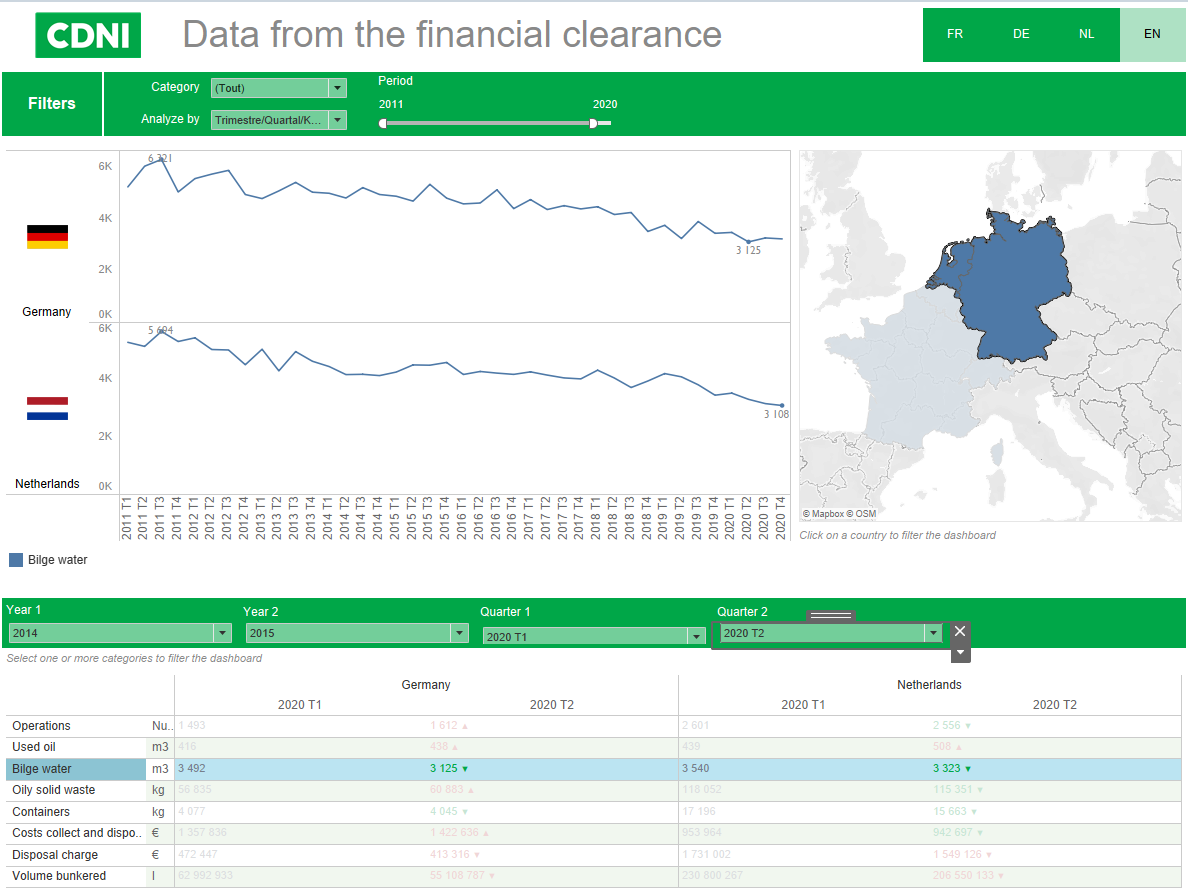Strasbourg, 13.12.2021 – The Conference of the Contracting Parties (CPC) met by video conference on 13 December 2021 for its winter session. Chaired by Mrs Muriel Bouldouyré, head of the French delegation to the CDNI, the meeting brought together the representatives of the six Contracting Parties and representatives of national institutions.
During this productive meeting, the CPC focused on the following subjects:

The CPC adopted its new work programme for the next two years. It covers the three parts of the Convention as well as general governance matters. Focused firmly on the future, the work programme sets ambitious tasks for the experts such as the dematerialisation of certain shipboard documents and the definition of the required international legal framework.
For Part A (oily and greasy waste), many tasks arise from the recommendations of the roundtable held on 8 April 2021. They aim to lay firm foundations underpinning a strategy for the future of the financing system.
For Part B (cargo-related waste), a major item will be preparing the entry into force of the new provisions for the handling of gaseous residues. It will include the drawing up of a new attestation of unloading to include degassing.
For Part C (other waste produced in the course of operating vessels), there are plans, inter-alia, to examine the possibility of creating a harmonised framework for financing the collection and disposal of these other waste products. The distribution of the guidelines on waste that is sorted and held on board (adopted in June 2021, see resolution CDNI 2021-I-7) will also be part of the CDNI’s mandate. The inclusion of swimming pool waste water as a new waste category is yet another ambitious task.
Resolution 2021-II-2
The French presidency, successfully conducted by Mrs Bouldouyré, will finish on 31 December 2021. The meeting of the CPS was an opportunity to look back on the events and most important actions of this term of office:
The Netherlands will take over the presidency of the CPC from France with effect from 1st January 2022, for a 2-year term. Mr Ivo Ten Broeke, the head of the Dutch delegation, presented his presidency’s priorities, focused in particular on the following points:

The 2021 annual report of the IIPC (International Clearance and Coordination Body) noted a significant fall in receipts of -5.74% in 2020. As instructed by the CPC, the IIPC presented a preliminary analysis of the state of the system as a consequence of the health crisis, based on quarterly clearances. One will note:
This observation demonstrates that the increase in the system’s receipts is entirely because of the increase in the disposal charge. It came into force just in time to avoid a deterioration in the financial situation. The Contracting Parties agree however that the objective of the increase in the disposal charge, namely the structural improvement of the relationship between receipts and expenditure has not been achieved.
A more in-depth analysis of the full year figures for 2021 will have to be conducted to comprehensively evaluate the state of the system and understand the balance between the system’s outgoings and receipts. This information will be prepared for the 2022 annual report and will be the basis for discussions on the amount of the disposal charge.
The disposal charge will be maintained at €8.50/1000 litres on 1st January 2022 (resolution CDNI 2021-I-3).
The IIPC’s annual reports are published on the CDNI’s website. They also contain an exhaustive description of the reception station network by country.
The CPC approved the go-live of a new tool for users: a dashboard featuring a dynamic display pulling together all the clearance data as far back as 2011 (these data are published by means of resolutions).
This tool aims to enable the user to gain an overview of system data (quantity of waste deposited, costs and receipts, volumes supplied) over a multi-year period, to compare them, and thus to understand system developments and trends.

The go-live on the CDNI website is scheduled for the beginning of 2022, the information will be notified by means of a newsletter.

The Contracting Parties reported on the progress made with the ratification procedures for amending the Convention adopted in June 2017 (see resolution 2017-I-4).
To date, three signatory States have ratified the new provisions for dealing with gaseous residues of liquid cargoes. Luxembourg deposited the instrument of ratification on 7 February 2020. The Netherlands deposited its instrument of approval at the end of the lockdown period on 3 July 2020. Germany deposited the instrument on 9 February 2021. As for Belgium, France and Switzerland, their work on ratification is continuing at national level. Parliamentary procedures were affected by the health crisis.
The amended Convention will come into force six months after the final instrument of ratification has been lodged with the depository authority, the Secretary-General of the Central Commission for the Navigation of the Rhine (CCNR).
Some degassing stations are already operational and accessible. The CPC confirmed the online publication of a public map of degassing stations for information purposes. They can be geo-located by means of an interactive map available here.
All the information on degassing regulations can be found on the dedicated page on the website.
The CDNI website’s design and tree structure has been updated to improve access to CDNI information and documents. The new features include a revamped homepage, more streamlined access to documents, a new layout for meetings and news, and the addition of a search engine for frequently asked questions (FAQ). The CDNI website URL will remain the same, namely: www.cdni-iwt.org.
The CPC regularly takes note of the answers to the frequently asked questions (FAQ) prepared by the CDNI/G Working group and approves their publication on the CDNI website www.cdni-iwt.org under the FAQ heading (available only in French, German and Dutch). The aim of the answers is to make it easier to apply the CDNI and to promote consistent interpretation.
At its December 2021 meeting, the CPC approved three new FAQs on the following subjects:
The next meeting of the CPC will be on 21 June 2022.
The working group will meet on 22 and 23 March 2022.
The IIPC will meet on 19 May.
The hearing of the approved organisations will be held at the end of June.
All the meeting dates, and agendas, are available on the CDNI website’s dedicated page.
Source: Adobe Stock